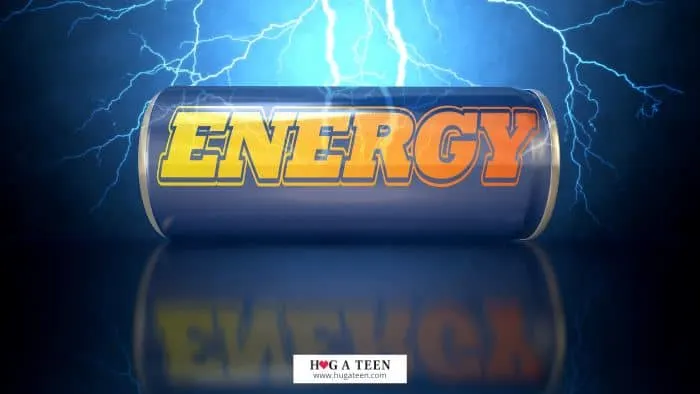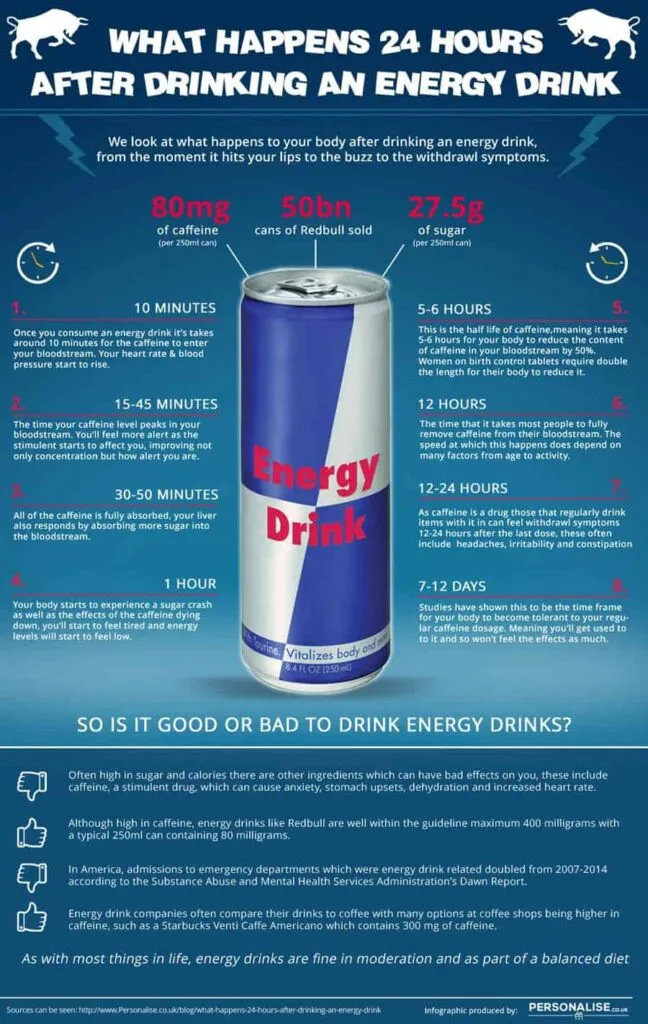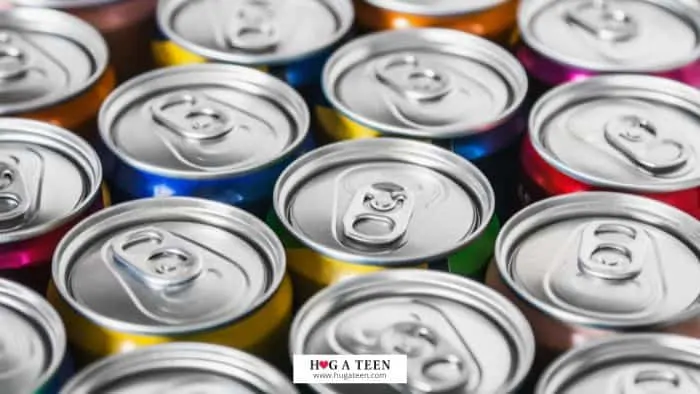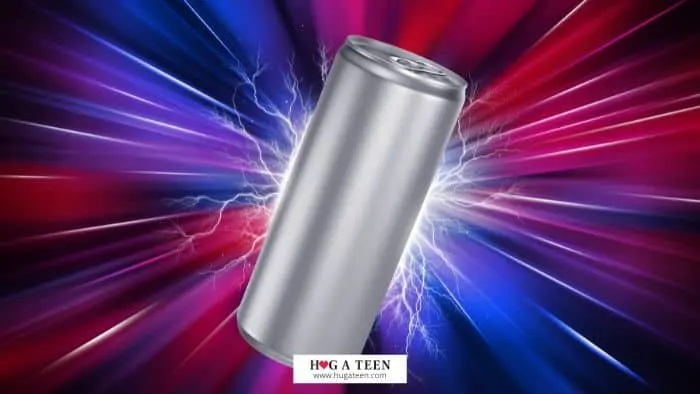Energy drinks can be great when you need that extra burst of energy for studying or sports or even when you haven’t slept well and need to get through the day.
To plan ahead, you might be wondering how long do energy drinks last. Keep reading to find out.
- How Long Do Energy Drinks Last In Your Body?
- Factors Affecting Caffeine Metabolism
- How Long Do Energy Drinks Last Unopened?
- How Long Do Energy Drinks Stay In Your System?
- What Happens 24 Hours After Drinking An Energy Drink?
- How Long Does An Energy Drink Keep You Awake?
- Does Energy Drink Make You Last Longer In Bed?
- How Long After An Energy Drink Can I Drink Alcohol?
- How Long After Drinking An Energy Drink Can I Breastfeed?
- Are Energy Drinks Bad For You?
How Long Do Energy Drinks Last In Your Body?

The purpose of energy drinks is to enhance both mental and physical performance. Caffeine is the primary stimulant used in these beverages, with sugar being present in most as well. However, certain brands may also contain plant-based stimulants like Guarana, Taurine, and Ginseng.
The duration of an energy boost from consuming an energy drink can vary based on several factors, such as the brand, amount of caffeine, individual levels of caffeine tolerance, and overall health.
Typically, it takes about 10-15 minutes for the caffeine in energy drinks to start working, and the effects of caffeine can last for 4-6 hours. However, the peak effects of caffeine are usually felt within 30-60 minutes of consumption and then gradually decrease over time.
The effects of Energy drinks kick in after about 10 minutes of consumption but last only a few hours. Their most potent effects only last an hour or two at most. After that first hour, the energy boost begins to ease, and you feel less of the energy drink’s effects. Within a few hours, there will not be enough extra caffeine in your body to provide any measurable increase in energy.
It’s important to note that while energy drinks may provide an immediate energy boost, excessive consumption can lead to negative side effects such as jitters, heart palpitations, and insomnia. It’s recommended to consume energy drinks in moderation and to be aware of the caffeine content in each drink to avoid overconsumption.Energy drinks should not be used as a replacement for sleep or as a way to cope with ongoing fatigue.
Factors Affecting Caffeine Metabolism
While every person metabolizes caffeine differently, several factors can affect how quickly or slowly this happens. These include genetics, age, body mass index (BMI), smoking status, medications, use of other substances, and certain foods or supplements.
1. Genetics
Genetics is one of the most critical factors in how caffeine is metabolized. Differences in the CYP1A2 gene can lead to variations in the speed at which caffeine is broken down and its effects on the body. Those with slower metabolisms may experience more significant stimulant effects from caffeine and take longer to clear the substance from their system.
2. Age
Age is another factor that affects caffeine metabolism. Older adults tend to break down caffeine more slowly than younger individuals, meaning they may experience more significant effects for a more extended period. In addition, children metabolize caffeine four times faster than adults since they have fewer enzymes responsible for breaking it down.
3. BMI
Body mass index also affects caffeine metabolism, as individuals with higher BMIs tend to break down the substance more slowly than those with lower ones.
4. Smoking
Additionally, smoking can increase the speed at which caffeine is broken down by up to 25%, while medications and other substances, such as alcohol, can slow it down.
5. Supplements
Certain foods and supplements can also affect how quickly caffeine is metabolized. For example, specific vitamins and minerals such as magnesium, calcium, and zinc can increase the rate at which it is broken down, while others, like iron, can slow it down.
By consulting with medical professionals, individuals can learn more about how their unique bodies process caffeine and determine the best way to use it. Ultimately, knowing how caffeine metabolism works can help people make better decisions surrounding their intake of this powerful stimulant.
How Long Does Red Bull Last?
Brand: Red Bull
Size: 8.4 fl (250ml) can
Caffeine: 80mg of caffeine
Sugar: 29 grams
Other ingredients: B-group vitamins -Vitamin B3 (Niacin), Vitamin B5 (Pantothenic Acid), Vitamin B6 (Pyridoxine), and Vitamin B12, Taurine, and water.
When you drink a Red Bull, caffeine enters your bloodstream within 10 minutes, causing an increase in heart rate and blood pressure. As the caffeine kicks in, levels in the bloodstream reach their peak within 30-45 minutes, and you will feel more alert and experience enhanced concentration.
However, after an hour, the caffeine effects start to diminish, and you may experience a sugar crash, leading to low energy levels and fatigue.
It takes around 5-6 hours for the body to eliminate 50% of the caffeine from the bloodstream, which is known as the “half-life” of caffeine.
The complete removal of caffeine from the bloodstream takes an average of 12 hours, although this varies based on individual factors.
Have a look at this Redbull infographic which shows how long Red Bull last in your body:

Regular Red Bull typically has a shelf life of 9 months, while sugar-free Red Bull can last up to 18-24 months when stored correctly and 48-96 hours after it has already been opened.
⚡For more info, you can read: Does Red Bull Have Alcohol?
How Long Does Monster Last?
Brand: Monster
Size: 16 fl (480 ml) can
Caffeine: 160mg of caffeine
Sugar: 55 grams
Other ingredients: Taurine, Niacin (Vit B3), Guarana, Ginseng, Riboflavin (Vit B2), Pyridoxine (Vit B6), and Vit B12.
Monster can boost energy for 6-8 hours after consumption and should be consumed within 24 hours of opening. Therefore, consuming it as soon as possible is best to ensure you get the most out of your energy drink. When stored correctly, Monster can stay fresh for up to 18-24 months from the manufacture date.
The main energy-boosting ingredient in Monster (and most energy drinks) is caffeine; however, Monster comes in a larger-sized can and therefore has more than some other energy drinks.
Monster contains 179mg of caffeine per 16 fl. oz, which is around twice as much as a cup of coffee.
Your body fully absorbs caffeine after about 45 minutes, and you may feel the effects for between five and seven hours, depending on your tolerance.
Depending on the individual, caffeine affects them differently. There are people who can drink a lot of it and barely feel any effects, while others feel the effects even when they drink only a little.
In addition to caffeine, Monster also has a very high sugar content, which will also give you a very short-term energy boost, which can often lead to a sugar crash a couple of hours later.
Regular Monster drinks will keep you awake for a varying amount of time, depending on how you react to caffeine and sugar.
⚡For more info you can read How Old Do You Have To Be To Drink Monster?
How Long Does Bang Energy Last?
Brand: Bang
Size: 16 fl (473 ml) can
Caffeine: 300mg of caffeine
Sugar: 0 grams
Other ingredients: Creatine and BCCAS (branched chained amino acids)
Caffeine enters your bloodstream about 10 minutes after you drink Bang Energy.
Within 30-60 minutes, caffeine has fully absorbed into your bloodstream, giving you an energy boost.
Bang’s 300 mg of caffeine can last up to four hours in your system, although it can last longer for people who are less tolerant of caffeine. The peak effect of caffeine wears off after 2 hours, with a half-life of about 5 hours, and it is completely gone after 24 hours.
Energy drinks are mainly made up of caffeine and sugar, which provide a boost of energy. The high caffeine content of Bang energy drink keeps you energized since Bang is a sugar-free energy drink that does not contain sugar.
Bang Energy has a shelf life of 12 months from its manufactured date, provided it is stored in conditions favorable for energy drinks.
How Long Does C4 Pre-Workout Last?
Brand: C4 Pre-Workout
Size: 6g serving (1 scoop) mixed with water
Caffeine: 150mg of caffeine
Sugar: 0 grams
Other ingredients: Beta-Alanine, Creatine, Citruline Malate, Velvet Bean seed extract, Theacrine, Vit C (Ascorbic Acid), Vit B3 (Niacin), Vit B6 (Pyridoxine), Vit B12.
C4 Pre-Workout effects typically last 1-4 hours. You should take the supplement 30 minutes before your workout for maximum effectiveness. Make sure you drink plenty of water during and after your workout to ensure optimal results.
How Long Does Celsius Last?
Brand: C4 Pre-Workout
Size: 12 fl (355ml) can
Caffeine: 200mg of caffeine
Sugar: 0 grams
Other ingredients: Green tea extract, Guarana, Taurine, Ginger root extract, Glucuronolactone, BCAA’s, Vit B complex.
Like most energy drinks, the caffeine in Celsius will enter your bloodstream within 10 minutes and peaks after about 30-45 minutes.
Due to the high levels of caffeine in Celsius, the energy boost may last longer than some other energy drink brands. Depending on your tolerance to caffeine, caffeine can last up to four hours in your system. After 2 hours, caffeine’s peak effect wears off, having a half-life of about 5 hours, and it is completely gone after 24 hours.
Celsius energy drink has a shelf life of about 24 months from the date of manufacture. However, this can be extended if it is kept in optimal conditions. Celsius should be stored in a cool and dry place and away from direct sunlight to ensure maximum potency and effectiveness. Once opened, it is best consumed within 24 hours.
⚡For more information, you can read: Does Celsius Have Alcohol?
How Long Does Alani Nu Energy Drink Last?
Brand: Alani Nu
Size: 12 fl (355ml) can
Caffeine: 200mg of caffeine
Sugar: 0 grams
Other Ingredients: Vit B6, Erythritol, Vitamin B12, Ginseng Root Extract, L-Theanine, Guarana Seed Extract, Vitamin B5, Taurine, Biotin, L-Carnitine Tartrate
Alani Nu Energy drinks claim to boost endurance performance, increase energy, and reduce weight. Additionally, it claims to contain only nutritious ingredients to help you perform better during a workout.
As with other energy drinks, the caffeine in Alani Nu takes about 30 minutes to kick in, and its effects can last for 3-5 hours.
Vitamins B6 and B12 are essential for energy production and metabolism and help you stay energized for 4-6 hours. Taurine helps with mental focus for 6-8 hours.
How Long Do Energy Drinks Last Unopened?

With proper storage practices, such as storing unopened cans or bottles of energy drinks in a cool, dark area, away from direct sunlight, you can expect most energy drinks to last for at least a year before their effectiveness declines.
When stored at room temperature, unopened energy drinks are usually safe to drink for six to nine months after the date on the package.
Is it safe to drink unopened energy drinks after their “expiration” dates? A commercially packaged unopened energy drink will typically have a “Best By,” “Best if Used By,” “Best Before,” or “Best When Used By” date – provided they are properly stored and undamaged – but this date is not a safety date; rather, it is the manufacturer’s estimation of how long the unopened energy drinks will retain their quality.
If the can is leaking, rusting, bulging, or severely dented, discard it.
Once opened, you should consume the energy within 1-2 days to preserve the flavor and effects.
Do Energy Drinks Go Bad After Opened?
Most companies recommend drinking it within 5 to 7 days, but the carbonation will dissipate within 24 hours if it is not resealed. It’s usually safe to drink an open can that hasn’t been in your fridge for more than a week.
However, once energy drinks are exposed to air and light, the drink’s taste, texture, and nutritional value diminish. The energy drink may develop an odd flavor or odor within a few days after being opened.
It is recommended to throw away open energy drinks that are not in the refrigerator. Open energy drinks should be thrown away if they are not refrigerated.
How Long Do Energy Drinks Stay In Your System?
The length of time that energy drinks stay in your system can vary depending on various factors such as the individual’s metabolism, the quantity and type of energy drink consumed, and whether or not it was consumed with food intake or other beverages.
The caffeine in energy drinks enters the bloodstream after 10 minutes and typically takes about 30-60 minutes to be fully absorbed into the bloodstream. Its effects can last for several hours. The half-life of caffeine, which is the time it takes for the body to eliminate half of the caffeine, is typically around 5 hours, being fully removed after 12 hours.
However, other ingredients in energy drinks, such as taurine and B vitamins, may stay in the system for longer periods. Some studies suggest that these ingredients may remain in the body for up to 12 hours or longer.
It’s also important to note that consuming large quantities of energy drinks or combining them with alcohol or other stimulants can significantly increase the duration and intensity of their effects, as well as the potential for negative health consequences.
What Happens 24 Hours After Drinking An Energy Drink?
The effects of an energy drink can be felt immediately as its high caffeine and sugar boost your alertness and energy. However, 24 hours later, the effects are markedly different. After the initial rush wears off, energy levels often crash due to the stimulants wearing off quickly. This can lead to withdrawal symptoms such as fatigue, headaches, drowsiness, and irritability.
The other ingredient in energy drinks that has long-term effects on the body is sugar. Many energy drinks not only contain high amounts of caffeine but also sugar, which can increase blood pressure and rapid heart rate. Studies have also shown that excessive drinking of these beverages and other soft drinks may increase the risk of developing type 2 diabetes.
Frequent energy drink consumption may have long-term health effects. Caffeine is a stimulant; too much can lead to jitteriness, anxiety, and insomnia. If consumed excessively or on an empty stomach, energy drinks can increase feelings of nausea and dizziness as well. Therefore, energy drink intake should be in moderation.
While energy drinks can provide a quick boost of energy, the effects don’t last long, and the withdrawal symptoms can be detrimental to your health. Therefore, you must be mindful not to have them in excessive amounts. Energy drinks are acceptable in a diet, provided they are taken in moderation.
How Long Does An Energy Drink Keep You Awake?
A single 8-ounce can of an energy drink containing caffeine boosts alertness and mental focus for up to 4 hours. However, it is essential to note that the effects may vary from person to person and may wear off sooner than intended. The key is to have them in moderate amounts.
Does Energy Drink Make You Last Longer In Bed?
The energy boost produced from the energy drink can play a role in you lasting longer in your physical performance in bed because it boosts your dopamine levels. However, there are no actual studies to prove that a rise in libido is directly linked to increased caffeine intake.
How Long After An Energy Drink Can I Drink Alcohol?
It is best to wait at least two to three hours after drinking an energy drink before consuming alcohol. Mixing alcohol and caffeine can lead to an increased risk of dehydration, intoxication, and a greater likelihood of risky behavior. Always wait a few hours until the caffeine has left your system.
How Long After Drinking An Energy Drink Can I Breastfeed?
Coffee is the main source of caffeine for most adults, and for most breastfeeding mothers and their infants, caffeine consumption in moderation (300 mg/d) is generally considered safe by the CDC.
The amount of caffeine in breast milk is at its highest between 1-2 hours after drinking it, so you should wait at least two hours after drinking an energy drink before nursing your baby. This gives the body time to metabolize the energy drink’s caffeine and ensure it won’t reach your baby through breast milk. While some studies suggest no associations between energy drink consumption and harm to the child, it is not advisable to breastfeed immediately.
Are Energy Drinks Bad For You?

It is true that energy drinks can be harmful both short- and long-term. Energy drinks contain high levels of sugar and caffeine, which can have profound withdrawal symptoms and other health implications if consumed excessively.
While energy drink intake can provide a burst of energy and mental focus, there is still a lot of debate surrounding their safety if used excessively and long-term. High caffeine levels in the body can increase blood pressure and heart rate. At the same time, sugar can lead to weight gain, diabetes, and other metabolic diseases.
In addition, caffeinated products often contain additives such as guarana, taurine, and ginseng. These additives can interact with other medications or supplements a person is taking, leading to potential side effects and cardiovascular disease.
The bottom line is having an energy drink now and then is probably fine. However, energy drink addiction can be dangerous. Therefore, medical professionals should help you monitor its effects on your body, especially if you overindulge. If you want a boost in energy, it is better to get your energy from natural sources like fruits, vegetables, and exercise.
Energy Drink Side Effects Long Term
While the ingredients in energy drinks can boost energy in the short term, they can also lead to long-term health effects. Dehydration, High Blood Pressure, Insomnia, Addiction, Weight Gain, and Abnormal Heart Rhythm are some potential health risks associated with energy drinks.
Can Energy Drinks Cause Long-Term High Blood Pressure?
One of the potential risks is high blood pressure or hypertension, which can lead to serious medical issues if left untreated. Energy drinks are unlikely to cause long-term high blood pressure on their own, but a few factors can play a role.
Side Effects Of Energy Drinks On The Brain?
Energy drinks may provide a temporary surge of energy, but the long-term effects of these drinks on the brain can be detrimental. Some studies suggest that energy drinks can increase anxiety levels due to their high caffeine, taurine, and other stimulants.
What Happens If You Drink Energy Drinks Every Day?
Regular consumption of energy drinks can lead to side effects such as headaches, insomnia, palpitations, high blood pressure, and even heart attacks. The caffeine in energy drinks can cause alertness and euphoria, which can be addictive and lead to overconsumption.
